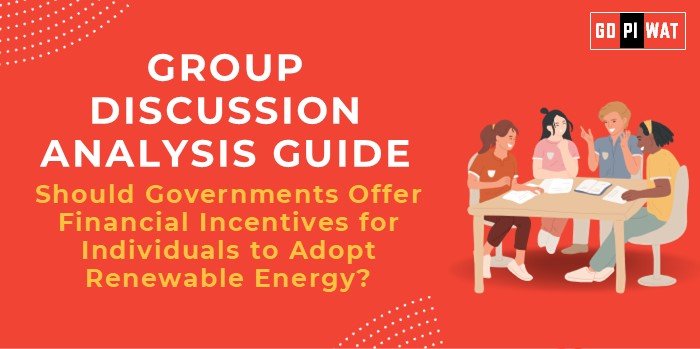📋 Group Discussion (GD) Analysis Guide: Should Governments Offer Financial Incentives for Individuals to Adopt Renewable Energy?
🌐 Introduction to the Topic
🔍 Opening Context:
Governments worldwide are intensifying efforts to combat climate change, and renewable energy adoption is a critical strategy. Financial incentives are one way to accelerate this transition, but their implementation raises debates about equity, efficacy, and sustainability.
📜 Topic Background:
Financial incentives like subsidies, tax rebates, and grants aim to reduce upfront costs for adopting renewable technologies such as solar panels and EVs. These policies have gained momentum globally, with countries like Germany and the U.S. leveraging them to boost green energy adoption.
📊 Quick Facts and Key Statistics
- 🌍 Global Renewable Energy Growth: 12% increase in capacity in 2023 (IRENA) – showcasing the global shift towards sustainability.
- ☀️ India’s Solar Adoption: Over 70 GW installed capacity as of 2024 (MNRE) – highlights government efforts.
- 💰 U.S. Tax Credits: 30% federal tax credit on solar installations (2023) – example of financial incentive impact.
- 📈 Global Investment: $1.3 trillion in renewable energy in 2022 (IEA) – underscores global commitment.
🤝 Stakeholders and Their Roles
- 🏛️ Governments: Policy design and funding.
- 🏢 Private Sector: Technology development and market scaling.
- 👨👩👧👦 Individuals: Adoption and maintenance of renewable technologies.
- 🌱 NGOs/Think Tanks: Advocacy and policy assessment.
- 🌐 International Organizations: Setting global standards and funding projects.
🏆 Achievements and Challenges
✨ Achievements:
- 🇩🇪 Germany’s Feed-in Tariffs: Increased renewable capacity significantly.
- 🇮🇳 India’s PM-KUSUM Scheme: Promoted solar pumps for farmers.
- 🇺🇸 U.S. Inflation Reduction Act: Incentivized EVs and solar energy adoption.
⚠️ Challenges:
- 💰 High Initial Costs: Implementation costs can strain budgets.
- ⚖️ Disparity in Access: Urban populations benefit more than rural communities.
- 🔄 Over-Reliance on Subsidies: May lead to unsustainable fiscal burdens.
🌍 Global Comparisons:
- 🇩🇪 Germany: Successful use of Feed-in Tariffs.
- 🇦🇺 Australia: Significant adoption of rooftop solar systems.
📚 Case Study:
India’s PM-KUSUM Scheme: Aims to deploy 3.7 million solar pumps, but faces logistical hurdles in achieving targets.
🧠 Structured Arguments for Discussion
✔️ Supporting Stance:
“Financial incentives bridge the affordability gap, enabling faster adoption of renewable energy.”
❌ Opposing Stance:
“Incentives may distort the market, leading to over-dependence and unsustainable fiscal policies.”
⚖️ Balanced Perspective:
“While financial incentives drive adoption, they should be complemented with education and infrastructure investments.”
💬 Effective Discussion Approaches
🎯 Opening Approaches:
- 🌍 Highlight recent success stories like Germany’s energy transition (Energiewende).
- 📊 Discuss the pressing global need for renewable energy adoption, referencing commitments under the Paris Agreement.
🛡️ Counter-Argument Handling:
- 📈 Use real-world data to refute claims, such as the ROI from incentives in the U.S. solar industry.
- 🤝 Emphasize complementary strategies like public-private partnerships.
📈 Strategic Analysis of Strengths and Weaknesses
- ✅ Strengths: Reduces financial barriers; boosts green job creation.
- ⚠️ Weaknesses: May disproportionately benefit wealthier individuals.
- 🌟 Opportunities: Scaling of renewable technologies; global leadership in sustainability.
- 🔴 Threats: Budgetary constraints; resistance from fossil-fuel stakeholders.
🎓 Connecting with B-School Applications
💼 Real-World Applications:
- 📋 Topics for projects: “Role of subsidies in clean energy transitions.”
💡 Sample Interview Questions:
- 💬 “How do financial incentives shape renewable energy markets?”
- ⚡ “Should governments focus more on infrastructure than incentives?”
🌱 Insights for Students:
- 🔍 Understand the economic and policy aspects of sustainability.
- 📖 Explore how financial incentives can be made equitable and impactful.


